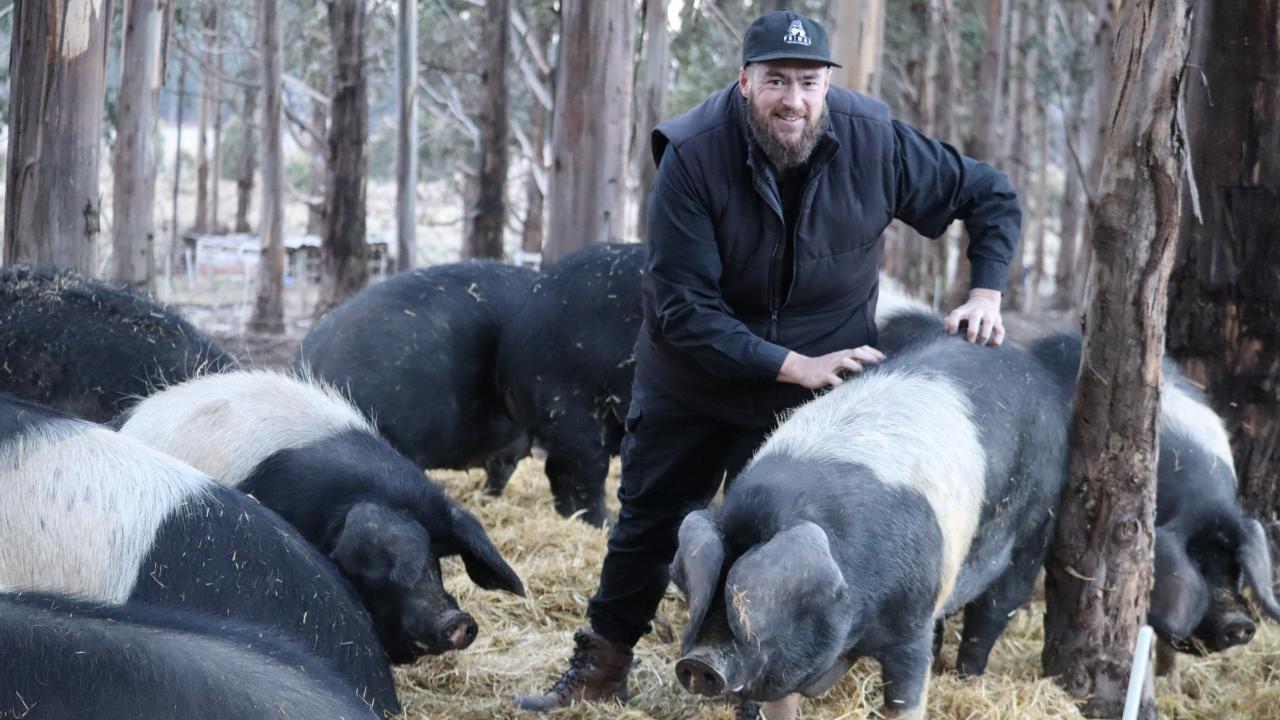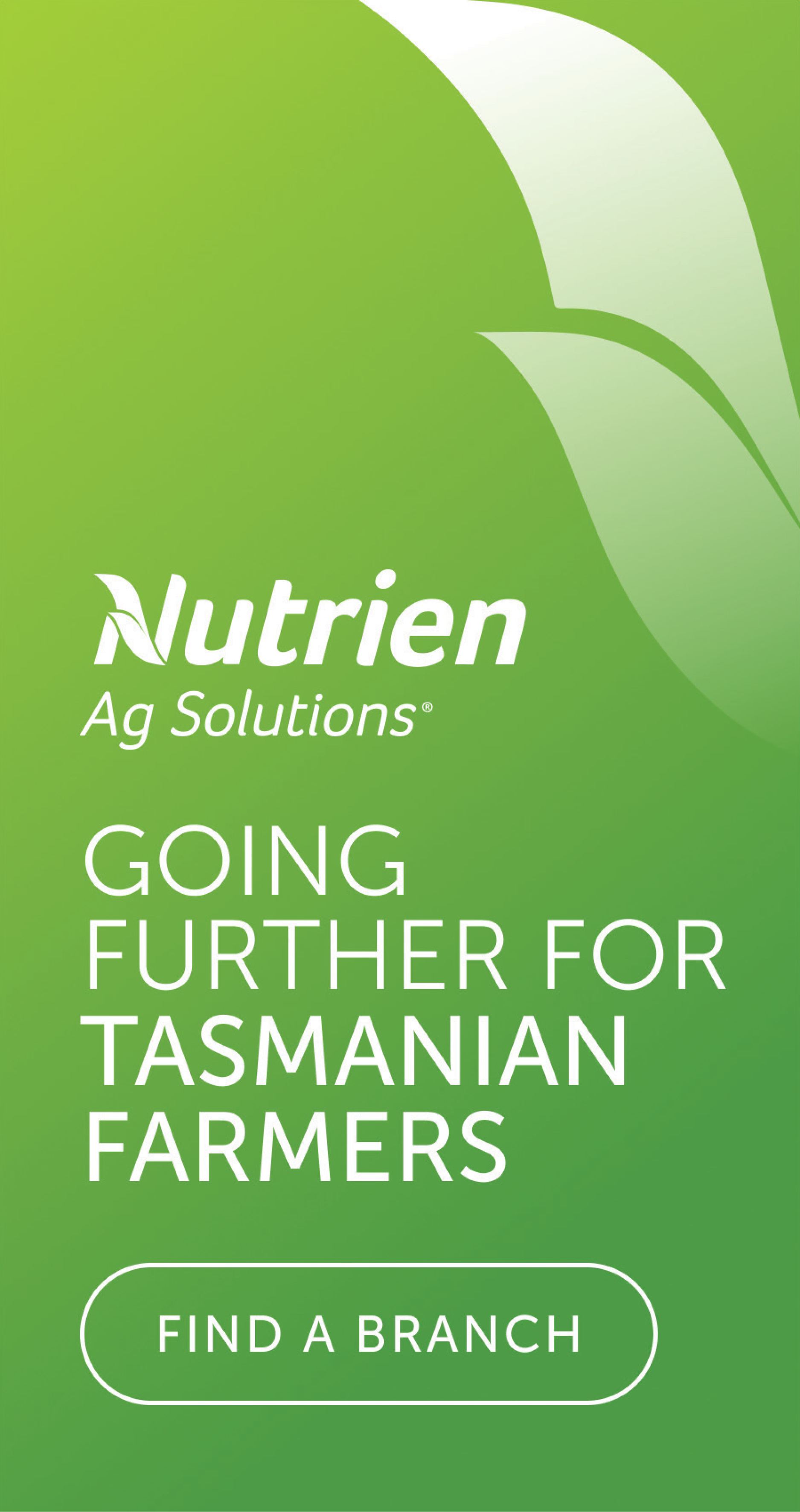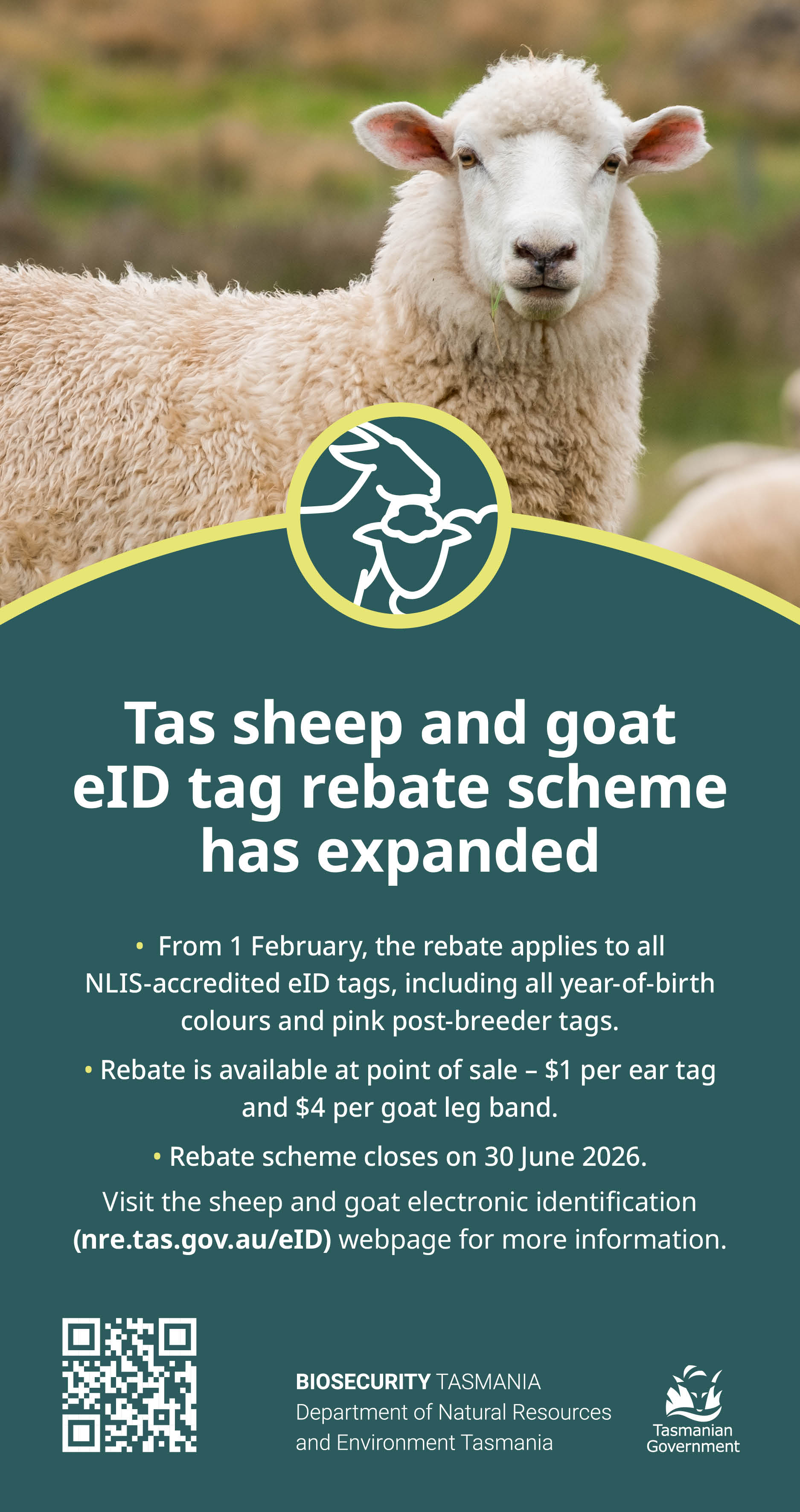Mangana farmer earns stamp of approval

From Pig Creek Farm to the Fingal Post office, William Russell has diversified his Primal Pastures business in ways he never expected.
The Mangana farmer, who specialises in producing ethical pork, beef, goat and lamb on 365ha of regenerated land on Tower Hill, has taken over the Fingal Post Office, saving it from closure and providing a shopfront for his meat products which include whiskey barrel smoked bacon, cheese kranskies using Ashgrove cheese, traditional ham, cuts of beef, lamb/hogget, goat, heritage pork and sausages.
One of the Fingal locals who led the campaign to fight for the post office’s retention, Hamish Thompson, called him a hero, saying everyone was dreading a commute to St Marys or Avoca to conduct their mail business.
“We started to feel unsettled about the future of the Post Office when the last licensee flagged her retirement late last year and then by May, Australia Post said if nobody is found to take it over it would be closed,” Hamish said.
“We knew if it closed we would never get it back, so we rallied, and the Stop Taking Away My Post Office (STAMP) committee was formed.
“We put out the word and 400 people gathered to make a cheesy awareness video that went viral on social media - and that got things happening.”
The Fingal Post office is the last remaining weatherboard post office in Tasmania and has been an essential service and community landmark for nearly 200 years.
When Will and his mum Maria heard about the potential closure an idea evolved.
“We had been thinking we needed a shopfront in town and we crunched the numbers and knew it wouldn’t be viable just as a Post Office, but if we could combine it with meat fridges and freezers to sell meat by the kilo and a micro bakery to use up lower value cuts we could make a go of it.
“It will become a place to support all local producers, from eggs and jam preserves to local art and craft.
“Mum is now the new licensee and I’ll be handling the farm produce sales.”
“If we can keep operating the Post Office, sell our meat and convince people to stop in the town it’s a win/win for everyone.”
William also sells live piglets, chicks, point of lay chickens and mini goats and cuts and delivers firewood.
He even value-adds to his regular Thursday run to collect spare grain from a Bicheno distillery for his pigs by delivering stock feed to other properties in the district.
Everything earned is poured back into the cost of regenerating the land, which was first settled in 1857.
At one point, the Tower Hill township had eight families, a school, telegraph office, saw mill, dairy farms, blacksmith, sheep shearing sheds and gardens to feed nearby communities involved in gold mining and prospecting operations.
In its next reincarnation it became a dairy but was then followed by forestry plantations, with the tree stumps left behind another challenge along with removal of the pinrush.
William, a former commercial beekeeper from Gippsland, Victoria, had always wanted his own land, and his family picked up the property six years ago at a “reasonable price”, complete with 70m mine shaft, an old miner’s hut and a renovated farmhouse.
He and his mum and her partner had only been living on-site for four months when, in December 2019, the farm was hit by bushfires, resulting in the loss of most of the boundary fencing but thankfully stopping just 50m from the historic buildings.
Since then the family has leased another 250ha and for the past four months fencing that land has been a priority.
The work he has achieved up until now is transformational and underpinned by huge tracts of on-contour permaculture swales to spread water evenly across the landscape.
More than 60,000 litres of water will be captured and held to irrigate what is a surprisingly dry and harsh landscape.
Sitting on the snowline, about 630m above sea level, winter temperatures get down to minus 8, it’s often extremely windy and the ridge dries out easily.
“There’s about 10km of swales in place now and not only will it keep moisture in the soil and negate the need for bores or pumped irrigation, it will keep the nearby streams and creeks flowing which will benefit everyone further downhill,” William said.
A carbon credit project with Sydney-based Permagen has seen the planting of 57,000 stems of 12 different varieties of endemic trees and shrubs, mainly flowering varieties to promote bees so William can add in his much-loved honey production in the future.
Smaller breed Lowline and Dexter cattle will be able to forage throughout the land without damaging the trees once they get well established.
They will add to the Belfair (Jersey Dexter cross) cattle already on site, the colourful herd of mini goats and the 32 Saddleback and Berkshire pigs.
Eventually Tamworths will be added to the mix and William is aiming for around 14 breeders and 120 piglets growing out.
The remaining nitens will be cleared from the property and Will plans to add farmstay accommodation huts that will have a view over the valley to the east coast.
“We’re building a life here and it’s where I’m hoping to raise a family,” Will said.
“My future wife will be moving here after Christmas and I can’t wait to show her how amazing the Fingal Valley community is.”From Pig Creek Farm to the Fingal Post office, William Russell has diversified his Primal Pastures business in ways he never expected.
The Mangana farmer, who specialises in producing ethical pork, beef, goat and lamb on 365ha of regenerated land on Tower Hill, has taken over the Fingal Post Office, saving it from closure and providing a shopfront for his meat products which include whiskey barrel smoked bacon, cheese kranskies using Ashgrove cheese, traditional ham, cuts of beef, lamb/hogget, goat, heritage pork and sausages.
One of the Fingal locals who led the campaign to fight for the post office’s retention, Hamish Thompson, called him a hero, saying everyone was dreading a commute to St Marys or Avoca to conduct their mail business.
“We started to feel unsettled about the future of the Post Office when the last licensee flagged her retirement late last year and then by May, Australia Post said if nobody is found to take it over it would be closed,” Hamish said.
“We knew if it closed we would never get it back, so we rallied, and the Stop Taking Away My Post Office (STAMP) committee was formed.
“We put out the word and 400 people gathered to make a cheesy awareness video that went viral on social media - and that got things happening.”
The Fingal Post office is the last remaining weatherboard post office in Tasmania and has been an essential service and community landmark for nearly 200 years.
When Will and his mum Maria heard about the potential closure an idea evolved.
“We had been thinking we needed a shopfront in town and we crunched the numbers and knew it wouldn’t be viable just as a Post Office, but if we could combine it with meat fridges and freezers to sell meat by the kilo and a micro bakery to use up lower value cuts we could make a go of it.
“It will become a place to support all local producers, from eggs and jam preserves to local art and craft.
“Mum is now the new licensee and I’ll be handling the farm produce sales.”
“If we can keep operating the Post Office, sell our meat and convince people to stop in the town it’s a win/win for everyone.”
William also sells live piglets, chicks, point of lay chickens and mini goats and cuts and delivers firewood.
He even value-adds to his regular Thursday run to collect spare grain from a Bicheno distillery for his pigs by delivering stock feed to other properties in the district.
Everything earned is poured back into the cost of regenerating the land, which was first settled in 1857.
At one point, the Tower Hill township had eight families, a school, telegraph office, saw mill, dairy farms, blacksmith, sheep shearing sheds and gardens to feed nearby communities involved in gold mining and prospecting operations.
In its next reincarnation it became a dairy but was then followed by forestry plantations, with the tree stumps left behind another challenge along with removal of the pinrush.
William, a former commercial beekeeper from Gippsland, Victoria, had always wanted his own land, and his family picked up the property six years ago at a “reasonable price”, complete with 70m mine shaft, an old miner’s hut and a renovated farmhouse.
He and his mum and her partner had only been living on-site for four months when, in December 2019, the farm was hit by bushfires, resulting in the loss of most of the boundary fencing but thankfully stopping just 50m from the historic buildings.
Since then the family has leased another 250ha and for the past four months fencing that land has been a priority.
The work he has achieved up until now is transformational and underpinned by huge tracts of on-contour permaculture swales to spread water evenly across the landscape.
More than 60,000 litres of water will be captured and held to irrigate what is a surprisingly dry and harsh landscape.
Sitting on the snowline, about 630m above sea level, winter temperatures get down to minus 8, it’s often extremely windy and the ridge dries out easily.
“There’s about 10km of swales in place now and not only will it keep moisture in the soil and negate the need for bores or pumped irrigation, it will keep the nearby streams and creeks flowing which will benefit everyone further downhill,” William said.
A carbon credit project with Sydney-based Permagen has seen the planting of 57,000 stems of 12 different varieties of endemic trees and shrubs, mainly flowering varieties to promote bees so William can add in his much-loved honey production in the future.
Smaller breed Lowline and Dexter cattle will be able to forage throughout the land without damaging the trees once they get well established.
They will add to the Belfair (Jersey Dexter cross) cattle already on site, the colourful herd of mini goats and the 32 Saddleback and Berkshire pigs.
Eventually Tamworths will be added to the mix and William is aiming for around 14 breeders and 120 piglets growing out.
The remaining nitens will be cleared from the property and Will plans to add farmstay accommodation huts that will have a view over the valley to the east coast.
“We’re building a life here and it’s where I’m hoping to raise a family,” Will said.
“My future wife will be moving here after Christmas and I can’t wait to show her how amazing the Fingal Valley community is.”




Add new comment